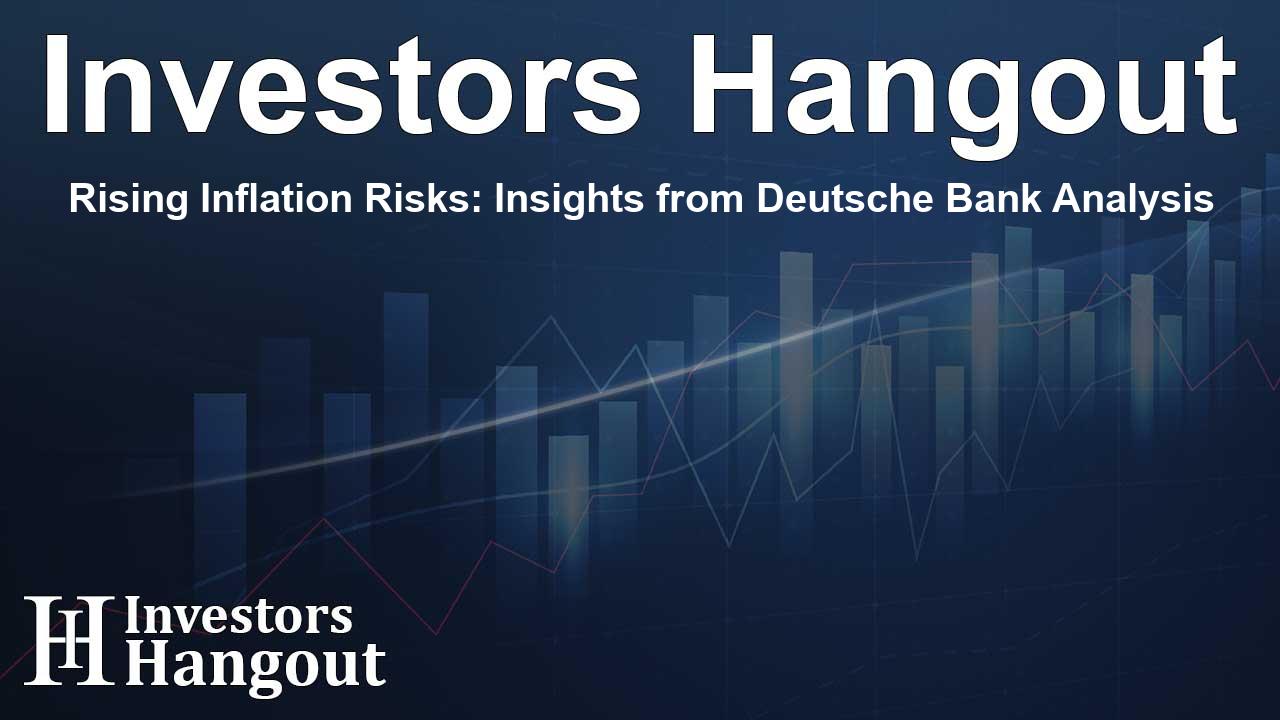Rising Inflation Risks: Insights from Deutsche Bank Analysis

Understanding Rising Inflation Risks for 2025
As we look ahead to the coming years, inflation remains a hot topic on everyone's minds. The financial analysts at Deutsche Bank have recently shared their insights, suggesting that inflation risks are poised to increase as we approach 2025. They articulate that these rising risks are not random; rather, they stem from a combination of structural trends and recent economic developments.
Structural Trends Influencing Inflation
Despite common beliefs that inflation will naturally return to target levels, Deutsche Bank highlights several persistent upward pressures that could exacerbate inflationary trends. A key factor is the loosened monetary policies adopted by central banks over recent months, which has led to a notable rise in money supply growth. This shift indicates a potential for inflation spikes that could catch many investors off guard.
Impacts of Global Tariffs
In addition to monetary factors, global tariffs have increased, contributing further to the inflationary pressures. The analysts point out that rising tariffs not only affect the cost of goods but could also deter global trade, leading to even greater strain on supply chains. These factors combined suggest that inflation is not merely a short-term concern but may become an enduring issue.
Policy Adjustments and Economic Pressures
Another significant aspect discussed by Deutsche Bank is the adjustment of central banks' mandates toward a more dovish approach, particularly through policies like average inflation targeting implemented by the Federal Reserve. These changes reflect a growing acceptance of the need to stabilize inflation rates rather than merely keep them in check.
Fiscal Spending and Ageing Populations
Moreover, fiscal pressures are increasingly influential. Governments continue to allocate resources to critical areas, especially concerning aging populations and national defense. Such spending amplifies inflation risks as it fuels demand in various sectors, leading to increased prices and a tighter labor market.
The Context of Low-Interest Rates
Importantly, Deutsche Bank emphasizes the unique low-interest-rate environment experienced during the 2010s, which was largely shaped by the aftermath of the Global Financial Crisis. Analysts argue that this period of low rates and moderate inflation was an anomaly, underlining that conditions have changed significantly since then.
Underestimated Inflation Risks
The team argues that many investors have been underestimating inflation risks, a miscalculation that has resulted in overly cautious expectations regarding central bank policies. This oversight has led to swift interest rate hikes that caught markets by surprise and overly optimistic outlooks for future rate cuts.
Conclusion: What Lies Ahead
In conclusion, Deutsche Bank's analysis paints a clear picture of the potential for rising inflation risks heading into 2025. Even though there may be a consensus that inflation will stabilize, it is increasingly evident that the risks associated with it remain skewed to the upside. Investors and policymakers alike must remain vigilant and adapt their strategies to account for these evolving economic circumstances. As the financial landscape continues to shift, understanding these dynamics will be crucial for navigating the future successfully.
Frequently Asked Questions
What does Deutsche Bank say about inflation risks?
Deutsche Bank indicates that inflation risks are rising due to structural trends and changes in monetary policy.
Are global tariffs contributing to inflation?
Yes, increasing global tariffs are cited as a contributing factor to rising inflationary pressures.
What is average inflation targeting?
Average inflation targeting is a monetary policy approach that aims to maintain inflation at an average level over time, rather than simply aiming for a specific rate.
How do fiscal policies affect inflation?
Fiscal policies, especially increased government spending, can drive demand and contribute to inflationary pressures in the economy.
Why were the 2010s considered an anomaly for inflation rates?
The 2010s were characterized by low-interest rates and moderate inflation, which analysts argue were unique conditions following the Global Financial Crisis.
About The Author
Contact Lucas Young privately here. Or send an email with ATTN: Lucas Young as the subject to contact@investorshangout.com.
About Investors Hangout
Investors Hangout is a leading online stock forum for financial discussion and learning, offering a wide range of free tools and resources. It draws in traders of all levels, who exchange market knowledge, investigate trading tactics, and keep an eye on industry developments in real time. Featuring financial articles, stock message boards, quotes, charts, company profiles, and live news updates. Through cooperative learning and a wealth of informational resources, it helps users from novices creating their first portfolios to experts honing their techniques. Join Investors Hangout today: https://investorshangout.com/
The content of this article is based on factual, publicly available information and does not represent legal, financial, or investment advice. Investors Hangout does not offer financial advice, and the author is not a licensed financial advisor. Consult a qualified advisor before making any financial or investment decisions based on this article. This article should not be considered advice to purchase, sell, or hold any securities or other investments. If any of the material provided here is inaccurate, please contact us for corrections.
